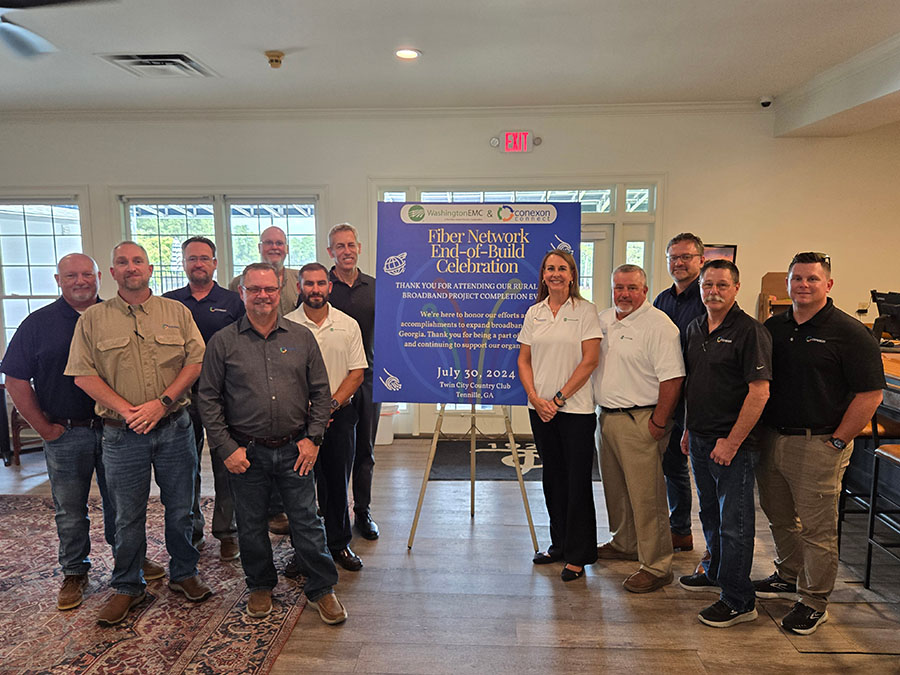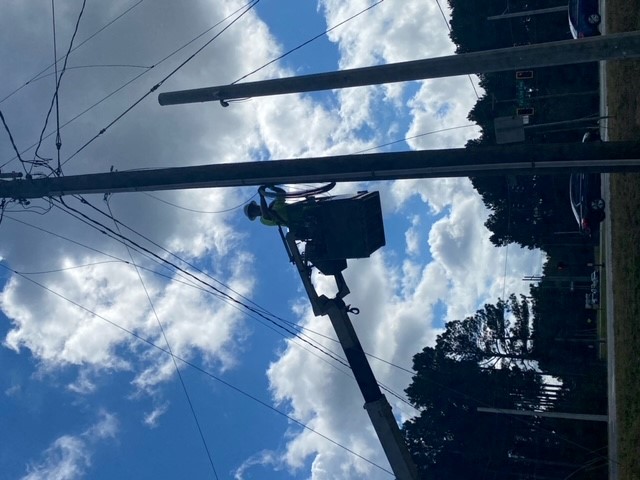Co-op Members
12,200
Total Miles of Fiber
2,500
Project Timeline
3 years
Success Story Update
Network Construction Complete: FTTH Now Available to 100% of Members
August 2024
Washington EMC, in partnership with Conexon Connect, has officially crossed a major project milestone with the completion of its fiber-to-the-home (FTTH) network build, spanning 2,500 miles and now reaching 100 percent of the co-op’s membership.
The completed Connect, powered by Washington EMC, fiber network delivers world-class high-speed internet access to approximately 12,200 members across 10 counties in rural Georgia.

The partnership leverages the advantages acquired through Conexon’s experience and strategic relationships as one of the nation’s leading rural fiber broadband providers, allowing Conexon Connect to expedite its project builds while streamlining costs. The $54.5 million project began in April 2021 and wrapped ahead of schedule in July 2024, becoming the third Connect FTTH network build to be completed.

ON NETWORK COMPLETION:
“In the last three years, the EMCs in Georgia have built a tremendous amount of fiber. We are serving areas that have never had service before. Everyone is realizing now that co-ops can get this done. If you give us space and let us go to work, we can build these fiber networks. That’s what we do. We build infrastructure to serve our members. It’s amazing how much we’ve all accomplished together.”


Success Story
Originally published: January, 2022
“Cooperation Among Cooperatives” is one of the seven principles that electric membership cooperatives (EMCs) hold in high regard. Whether sending line workers across state lines to assist in storm restoration or offering aid to employees in times of need, cooperatives regard one another as family and never hesitate to answer the call for help.
That same spirit of cooperation is now driving the expansion of high-speed fiber internet into rural communities across the state of Georgia, as a collaboration among seven EMCs and Conexon addresses this dire need.
“By nature, EMCs are not risk takers,” said Wendy Sellers, President and CEO of Washington EMC (WEMC).
“We’ve known of the need for high-speed connectivity for several years and have been exploring solutions, but we did not want to be in the broadband business.”
“With only five members per mile of line in our territory, there is not a large return on investment for a ‘for-profit’ company. It became obvious that no one was going to take on the project,” Sellers said. “Our board decided that we had to find a solution that worked for our membership.”
“Conexon consistently shares its knowledge with our cooperative, which is helping to train our employees throughout network construction. It would have been difficult for us to find this level of expertise locally.”


Sellers began having conversations with colleagues at nearby EMCs and their feedback echoed WEMC’s own position – each cooperative stood ready to act on a viable solution to serve its members, but not at the risk of impacting its primary mission of providing exceptional electric service. The group began exploring options together and ultimately found a partner in Conexon.
Through its Internet Services Provider (ISP) arm, Conexon Connect, Conexon offered a unique and flexible solution. This first-of-its-kind model addressed the biggest concern of each consortium member – the risk of owning and operating a fiber broadband subsidiary – and Conexon possessed the expertise to bring a new fiber network to life.
For WEMC, this was a solution that would provide broadband access to 100% of its membership, without adding strain to the lean operations of the utility provider. WEMC will own the fiber and lease excess capacity to Conexon Connect. Connect will provide the retail service to homes and businesses, managing account set-up, customer service, operations, marketing, and billing.

“Our members are long-term asset owners,” Sellers explained. “They own this network, and we want to do the right things to benefit them throughout this project.”
“Conexon consistently shares its knowledge with our cooperative, which is helping to train our employees throughout network construction. It would have been difficult for us to find this level of expertise locally, especially in a small, rural area,” Sellers said. “Additionally, Conexon’s relationships with contractors and national reputation have helped us secure some of the materials and resources we need for the network construction.”
Just like the grid that delivered electricity to rural Georgia in 1937, the construction of the fiber network is designed with the future in mind. In addition to high-speed internet, fiber also enables enhancements and smart grid capabilities to the electrical infrastructure, including improved power outage response times, better load balancing, more efficient electricity delivery, and others.
“Beyond broadband access, who knows where technology is going for the future of metering and SCADA systems. With this network, we are prepared for what’s to come,” she said.
Washington EMC’s $54.5 million fiber network is expected to be completed within three years. The first customers will be connected in 1Q 2022.